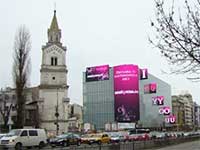Cyberwarfare: Innocent Victims
 Cyberwarfare
CyberwarfareThere seems to be no war around, but look what's going on. American and European media are writing only about cyberattacks from Russia, about interference in elections and so on. And President Putin, commenting on the results of the World Cup, talks about almost 25 million cyberattacks on Russian state structures only for the month of the World Soccer Cup. It turns out that the cyberwarfare is indeed raging on, only by other means and methods. And this war has victims, unfortunately, most often innocent.
In the past few years, the topic of “smart cities” (and dozens of related digital technical projects) has become an inexhaustible source of news. News is mostly good: in all parts of the world in cities there are intelligent transport systems, digital video surveillance systems, smart lighting systems, advertising management, public address systems etc.
However, there is also the reverse side of the coin: “smart” infrastructure systems turn out to be not so smart, they do not withstand ongoing hacker attacks, they are vulnerable to ever more sophisticated intruders. And those, in turn, are no longer limited to attacks on bank accounts, but aim to penetrate into the closed databases, communication and data exchange systems, distort or replace the transmitted information. Informational chaos is very difficult to transform back into a coherent order.
From time to time events occur, similar to the one we decided to talk about today. In March 2018, computers in the city administration of Atlanta (the largest city in Georgia with a population of 6 million people and the most dynamic growth of the urban metropolitan area in the USA) were infected with a malicious program called SamSam. As a result, city services were forced to stop servicing the population for a whole week. Experts called this attack the most significant cyberattack against a large city.
You may recall another recent egregious case, when 50 000 video cameras in Japan were hacked and turned into a source of DDoS attacks around the world.
It cannot be said that no one imagined anything like this. In 2014, IT specialists at the University of Michigan conducted a “research” attack on the city's transport network and created temporary chaos on the roads of the city, disabling more than a hundred traffic lights. The conclusions drawn are not indicative of product shortcomings (in this case, traffic lights), but of our system unpreparedness for security threats.
Examples, like the case in Atlanta or Michigan, continue to multiply. Specialists already warn that the number and sophistication of cyberattacks will only increase. Several hacked traffic lights or road cameras is painful enough. And what if critical national infrastructure facilities are at risk?
Across the world, cities are increasingly using digital solutions. Smart meters are already helping thousands of people to keep an economical record of water and electricity consumption. Intelligent traffic management systems help to significantly reduce the level of carbon dioxide by reducing or preventing the formation of traffic jams.
But you should not forget about safety. Previously, management systems were created without taking into account the threat of hacking or cyberattacking.
We quickly get used to the good and want more. We like cars without keys, smart parking meters, home lighting and air conditioning with control over the smartphone - the list is getting longer with each new day. Not surprisingly, by 2020, the number of devices connected to the Internet can, according to some estimates, reach 50 billion. What a joy for manufacturers of smart devices. But at the same time this also means an exponentially growing market of security services, the development of new methods and platforms that prevent attacks.
Prevent attacks, close as many loopholes in our devices as possible, do not become innocent victims of cyberwarfare - is this not a wish for us all for the future. And it can be done only by combining efforts from special services, developers, manufacturers and operators of intelligent systems.





